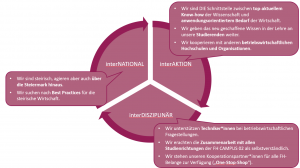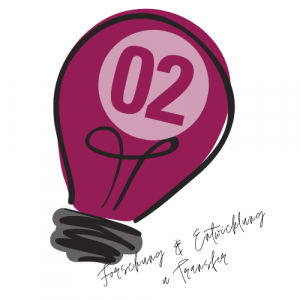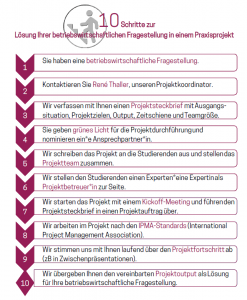Research, development and transfer
In our research, development and transfer activities in the "Accounting & Controlling" degree programme, we are guided by our mission statement from three perspectives:
OUR EXPERTISE FOR YOU!
In our field of study, we regularly evaluate the needs of the economy and currently specialise in the following key areas in our research and development activities:
The megatrend of digitalisation poses new challenges for accounting and controlling. However, the trend also offers opportunities that need to be utilised.
Digitalisation is leading to the automation of entire accounting processes and is bringing about fundamental changes in organisation, processes and business models. The threat of cybercrime is also growing. The costs and benefits of digitalisation are to be analysed in detail, as are the consequences for IT security, the internal control system (ICS) and risk management, as well as process and knowledge management.
The classic management cycle of goal setting, planning, controlling and reporting will continue to exist. However, the potential of digitalisation must also be used for corporate management. In particular, dealing with exponentially increasing data volumes will become a success factor (big data). Company-specific solutions for Controlling 4.0 must be developed. Micro, small and medium-sized enterprises (SMEs) should be enabled to analyse the relevant information from internal and external data sources in a targeted manner in order to make well-founded decisions. It is necessary to optimally resolve the tension between practicable applicability and comprehensibility as well as sufficient scientific and theoretical foundation.
It is also necessary to investigate how the requirements profile for controllers is changing as a result of digitalisation in order to ensure that students' skills are developed in line with their needs through transfer to teaching.
With reference to CAMPUS 02's central R&D digitalisation strategy, this focus is assigned to the subject areas “Digital SME at company level” and “Digital internal processes in SMEs”.
Socially responsible and sustainable behaviour by companies (‘Corporate Social Responsibility’) describes the voluntary contribution of business to sustainable development that goes beyond the legal requirements. In addition to the ecological and economic dimensions, sustainable corporate management also includes the social component and requires companies to act accordingly. This applies to all areas of the company, from the classic operational value-added areas of procurement, production and sales through to organisation, accounting and controlling.
One objective of this focus area is the conceptual development of practice-orientated sustainability models for companies. However, the mere development and integration of instruments is not enough. In order to guarantee the implementation of these sustainable measures, they must be directly linked to the core business of the respective company. This requires a detailed analysis of the company's divisions, objectives and strategies. One way to ensure the integration of sustainable corporate management into the corporate strategy and the implementation of operational sustainability decisions is to set up a sustainability controlling system. This is used to generate data and analyse performance based on the three sustainability dimensions.
Sustainability reporting communicates performance to stakeholders and is therefore part of a successful communication strategy. This area is becoming increasingly important as new legislation both nationally and internationally requires more and more companies to disclose their commitment to environmental, social and employee matters in the form of non-financial reports.
Another field of activity of this specialisation is the empirical investigation of economic effects. The significance of projects, events and other activities that increase regional demand for goods and services is analysed objectively and based on data using established macroeconomic value creation models. Exemplary questions are
- ... What are the regional economic effects of an investment project?
- ...result from changes in the tax/transfer system?
- ... bring sporting or cultural events?
- ... arise from tourism activities or projects
- ... generate sports or cultural clubs?
Regional economic effects are defined here as effects on regional value added, regional employment, regional income and taxes and duties. Direct, indirect and induced effects are quantified.
HOW CAN WE SUPPORT YOU?
Based on the latest scientific findings, we develop customised solutions for your business issues. Our approach is characterised by two key principles: quality and practical relevance.
Please get in touch with us to clarify which type of collaboration is the most expedient for you. We will be happy to support you from the initial idea through to successful project realisation!
You can book an appointment to discuss customised cooperation options directly here:
Appointment booking
Practical projects
In practical projects, students work together with lecturers on their specific questions.
Download the guide: 10 steps to solving your business management problem
Your advantages as a cooperation partner for a practical project
- Student resources are made available to you for the duration of the project.
- An expert works as a project supervisor. This provides the company with professional input.
- The mix of experiences with different professional backgrounds of the participants shows interesting perspectives for your specific topic.
- Some of our cooperation partners incorporate our projects into their employer branding in order to reach students as future employees.
- As a university of applied sciences, we are constantly gaining up-to-date insights into the economy. This enables us to adapt our curricula to the changing requirements of the economy. In this way, we ensure that our training is tailored to your needs - for you too.
Internships
Our Bachelor's degree programme students have to complete an internship in the 6th semester. The internships last at least 12 weeks in the period from January to June (at least 30 hours per week).
If you are interested in employing interns, simply send us a short internship advert - we will be happy to publish it on our platforms. The students will apply directly to you.
Scientific work
Our aim is to publish a high proportion of bachelor's and master's theses with practical relevance. Our future graduates produce concrete results for you and demonstrate their expertise in scientific working methods. Students are supervised throughout the entire process by an expert from our degree programme.
General information on R&D services at CAMPUS 02 can be found here.




